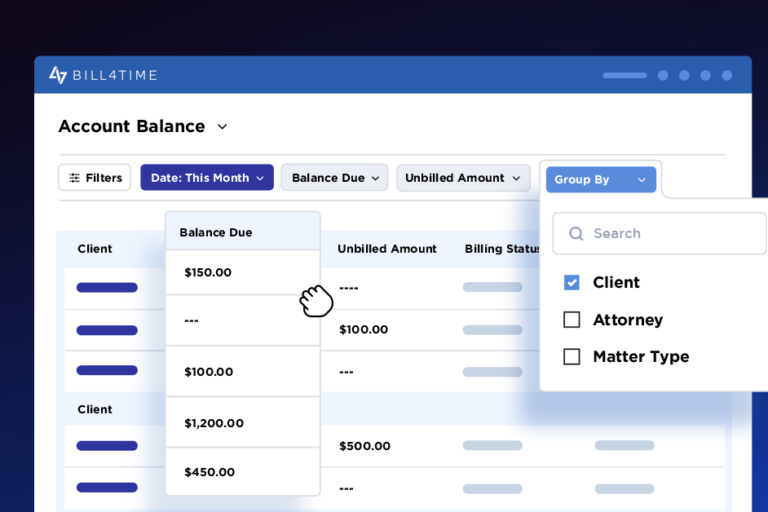
How Many Hours Should an Attorney Bill a Year? Setting Realistic Expectations For Your Practice
10/24/2025 By Clare Sheehan
How many hours should an attorney bill annually? Realistically, billing expectations shift depending on the firm, practice goals, and many other nuanced factors. While most firms aim for anywhere between 1,700 and 2,300 billable hours in a year, the real challenge extends beyond meeting that number and concerns efficiency. Many attorneys struggle to hit their billing goals not because they aren’t working enough, but because time gets lost to administrative friction, task switching, and time-sucking processes. The solution lies in understanding how much time is truly available for billable work—and how attorney billing software can help attorneys recover the hours that slip through the cracks.
Want more legal billing resources? Check out our attorney billing cheat sheet.
Attorney Billable Hours Expectations vs. What Gets in the Way
A typical attorney’s workday is packed from start to finish. But only a portion of those hours make it onto an invoice. Internal meetings, document management, client communications, time tracking, and invoicing all consume valuable minutes that can’t be billed. Industry data shows that the average utilization rate—the percentage of time attorneys spend on billable work—is just 31%.
In other words, the typical attorney is compensated for only about 2.5 hours of work each day.That means a significant portion of a workday is lost to non-billable activity. Over the course of a year, this can add up to hundreds of hours, the difference between meeting firm goals and falling short. Of course, even though these numbers represent an average, the big law billable hour requirements will naturally differ from those at small and solo practices.
Why the Gap Exists
- Manual timekeeping slows everything down
Even experienced attorneys lose time when they rely on spreadsheets, handwritten notes, or memory to track hours. Reconstructing the day’s work later leads to underbilling and incomplete records. These small gaps—just a few missed minutes per task—add up to significant lost revenue over time.
- Administrative tasks consume billable capacity
Billing, invoicing, reviewing payments, and chasing collections are necessary, but they pull attorneys away from client work. Many firms underestimate how much administrative load eats into productive hours. Reducing that overhead directly increases available billable time.
- Lack of visibility into performance metrics
Without accurate reporting, it’s difficult to see where time is being spent or where efficiency breaks down. Firms that can’t easily identify unproductive patterns—such as overstaffing a matter or excessive time spent on low-value tasks—miss opportunities to improve performance.
- Disconnected systems create bottlenecks
When time tracking, billing, and reporting systems operate in silos, staff end up duplicating work. Manually transferring data between platforms wastes time and introduces errors. Integrated workflows eliminate those handoffs, freeing up hours every week.

Setting a Realistic Annual Billing Target
A sustainable, high-performing attorney often bills between 1,600 and 1,900 hours per year. This range accounts for necessary non-billable responsibilities while maintaining a strong contribution to firm profitability. To reach 1,800 billable hours, an attorney must average about 150 hours per month or 7.5 hours billed per workday. Achieving this consistently isn’t always about working longer—it’s also about understanding where time is going and how to make the most of it. That’s where Bill4Time’s advanced reporting and analytics become essential. The platform allows firm leaders to track and visualize key performance indicators like:
- Billable hours by attorney, client, or practice area: see who’s meeting targets and which areas need support.
- Realization and collection rates: determine how much of the time billed is actually collected, identifying potential revenue gaps.
- Non-billable activity tracking: analyze how much time is being spent on administrative work and where efficiencies can be gained.
- Year-over-year trends: evaluate how productivity has shifted over time to make more informed staffing and resourcing decisions.
With these insights, firm leaders can move beyond guesswork. Instead of setting the same blanket billable-hour goals each year, they can use real data to create achievable, performance-driven targets that reflect the realities of their workload and operational structure. By leveraging Bill4Time’s reporting features, firms can also spot early signs of inefficiency—such as time leaks in certain workflows or uneven distribution of client work—and make proactive changes before they impact revenue.
How Bill4Time Helps Firms Capture More Billable Hours
Bill4Time was built to solve the very inefficiencies that limit productivity and billing accuracy. By automating time tracking, reducing data entry, and providing firms with clear insights into performance, this process helps every attorney make better use of their working hours. Here’s how Bill4Time supports operational efficiency across the board:
1. Real-time time tracking
Bill4Time lets attorneys record billable activity as it happens. No more reconstructing the day or estimating time after the fact—just accurate, real-time entries that ensure every minute of client work is captured.
2. Automation that reduces repetitive work
With features like pre-filled templates, default billing codes, and automated invoice generation, attorneys spend less time on manual entry and more time on client matters. Routine administrative steps become background processes instead of time sinks.
3. Centralized, connected workflows
Bill4Time integrates timekeeping, billing, payments, and reporting in one platform. By eliminating the need to switch between systems, firms minimize data duplication, reduce error rates, and save hours each week.
4. Insightful reporting and performance analytics
Detailed dashboards show exactly where time is being spent across clients, matters, and practice areas. Firms can identify which activities generate the highest returns, spot inefficiencies, and make informed decisions to boost profitability.
5. Faster, more accurate billing cycles
By automating invoice creation and client communications, Bill4Time accelerates billing turnaround and reduces time-to-payment. The result: stronger cash flow and fewer administrative backlogs.
Turning Efficiency Into Measurable Gains
Every hour saved from manual work or inefficient processes directly increases an attorney’s billable capacity. For example:
- If a mid-sized firm with 20 attorneys recovers just 15 minutes per day, that’s roughly 936 additional billable hours per year—without adding staff or extending workdays.
- Streamlined time capture also improves realization rates, ensuring more of the time worked is actually billed and collected.
By focusing on operational efficiency, firms create a more productive, profitable environment where output improves naturally. Bill4Time helps firms close the gap between potential and performance. By streamlining time capture, automating billing, and providing real-time insight into productivity, it ensures attorneys can focus on what they do best: delivering value to clients and growing the firm’s bottom line. In short, the path to higher billables isn’t longer hours—it’s smarter operations.



